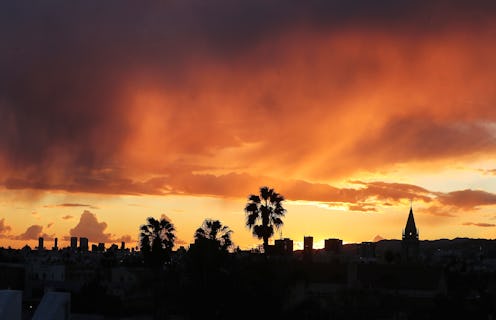
Daylight Saving Time is almost upon us, and you know the deal: Spring forward, fall back. But, having experienced this time hopping phenomenon 53 times myself in my 27 years of existence, I never actually see it coming until, one random Sunday in March, I'm wondering why the heck am I so freaking tired. When is Daylight Saving Time 2016? Longer days will be here sooner than you think, my friends, even if it does mean you have to lose an hour of sleep to get them. Nothing in this world is free, am I right?
Officially, Daylight Savings occurs every second Sunday in March, when we turn our clocks an hour ahead, and the first Sunday in November, when we set them back an hour. This month, Daylight Saving Time is on March 13. Other than the slight grogginess you might feel having lost an hour of precious Zs, you probably won't even notice that DST has hit — most digital clocks automatically adjust to the time change. But, if you're still clutching to analog time (you hipster, you), Daylight Saving Time occurs at 2 a.m. on Sunday morning, when time jumps ahead an hour to 3 a.m. So, make sure to set your clocks accordingly before you go to bed, or else risk being an hour late to brunch.
Honestly, I have a love-hate relationship with Daylight Saving Time. On the one hand, I love the idea of walking home from work when it's still light outside. But, as someone who commits her life to hitting snooze, the idea of losing an hour of sleep feels like a punch in the face. Why do we have Daylight Saving Time, anyway? Officially, Daylight Saving Time was signed into law in 1966 by President Lyndon B. Johnson, as part of the Uniform Time Act. Up until then, different states and cities could implement their own clock changes as they saw fit, but as you can imagine, the lack of consistency led to a whole lot of unnecessary confusion. Today, every state except for Hawaii and most of Arizona observes Daylight Savings on the second Sunday of March, when clocks get moved an hour ahead.
But even though the majority of states follow Daylight Saving Time, the time change comes with other problems. According to National Geographic, the average American worker loses about 40 minutes of sleep thanks to DST, and that shift in sleep patterns can lead to all sorts of trouble. In fact, there are 40 percent more heart attacks the Monday after Daylight Saving Time than any other Monday during the year, likely due to the disruption of people's sleep cycles. Kinda scary when you think about it, right?
No matter what your feelings on DST, though, it's coming one way or another — so you might as well find a way to cope. Look at it this way: Losing sleep is never fun, but longer days are coming, and summer is definitely something to get excited about.
Images: Mario Tama/Getty Images; Giphy